By Maria Teresa Jones
“The hand of the Lord came upon me and He brought me out by the Spirit of the Lord and set me down in the middle of a valley. It was full of bones. He let me all around them, there were very many laying in the valley and they were very dry. He said to me, ‘Mortal, can these bones live?’ I answered, ‘Oh Lord God, you know.’ Then He said to me, ‘Prophesy to these bones and say to them, ‘All dry bones hear the word of the Lord.’ Thus says the Lord God to these bones, ‘I will cause the breath to enter you and you shall live. I will lay sinews years on you and will cause flesh to come upon you and cover you with skin and put breath in you, and you shall live, and you shall know that I am the Lord.’
So I prophesied as I had been commanded and as I prophesied suddenly there was a noise, a rattling and the bones came together bone to its bone. I looked and there were sinews on them and flesh had come upon them and skin had covered them but there was no breath in them. Then he said to me, ‘Prophesy to the breath, prophesy mortal and say to the breath, ‘Thus says the Lord God, come from the fore winds Oh breath and breathe on these slain that they may live.’ I prophesied as He commanded me and the breath came into them and they lived and stood on their feet, a vast multitude.
Then He said to me, ‘Mortal these bones are the whole house of Israel, they say our bones are dried up and our hope is lost, we are cut off completely.’ Therefore, prophesy and say to them, ‘Thus says the Lord God, I am going to open your graves and bring you up from your graves all my people. I will bring you back to the land of Israel. And you shall know that I am the Lord when I open your graves and bring you up from your graves all my people. I will put my Spirit within you and you shall live, and I will place you on your own soil then you shall know that I the Lord have spoken and will act.'”
The invitation to hope
Poor Ezekiel, in exile, traumatized, suffering, grieving the loss of his home, his temple. I think Ezekiel is misunderstood and gets a bad rap. You see, he was all about oracles of destruction, judgment, bizarre visions and the most offensive language about women. But at the very end, he throws everyone for a loop with his prophecies of consolation and restoration, of moments of brilliance, like the vision of the valley of the dry bones. And as the old saying goes, “There is a fine line between genius and insanity,” and Ezekiel erased that line.
So, what does the valley of the dry bones has to do with my trip last year to Puerto Rico? You see, Puerto Rico or as I like to refer to my island, Borikén, its indigenous name, is my valley of dry bones. And if we are honest, we all have our own unique valley of dry bones. The power of Ezekiel’s vision is not on the bones coming together, the power is in the invitation to hope and to reclaim God’s giving gift to choose to speak life into the direst of our situations.
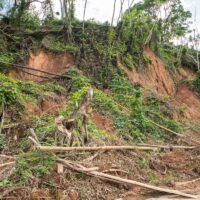 Looked like a war zone
Looked like a war zone
I went home in June, exactly a year from my previous visit and nine months after the worst hurricane made landfall in Puerto Rico. Flying over my island all I could see for miles was a blue ocean, not of tropical Caribbean waters but an
ocean of blue tarps covering spaces where thousands of roofs once laid. The valley of dry bones greeted me as I drove to the island’s east coast, the entry point of hurricane Maria. Street signs and stop lights gone. Massive piles and piles of palm trees that once swayed to ocean breezes, gone. Tropical fruit trees with their enormous root balls stacked along the highways and coastlines. Glorious beaches completely stripped of their sacred umbrellas.
The heat felt greater from the lack of shade. Houses, gas stations, schools and entire shopping centers, parks and stadiums, gone. My host, Ryder Hospital of Humacao, lost its top four floors, the operating room, the cardiac intensive care unit, the NICU, and their labor and delivery unit. Imagine a hospital, caring for entire communities out of their emergency room, turned into a clinic and disaster shelter.
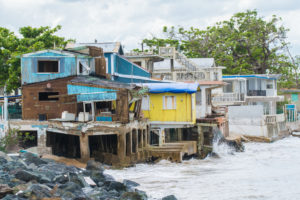 Sometimes there is electricity and water and sometimes not. You never know when you will lose them both, and when gone, the people are re-traumatized. The suicide rate increased by 29 percent, with a total of 253 post-Hurricane-Maria suicides reported. PTSD is a real situation crisis and caring for caregivers is at a critical need. The death toll could be as high as 10,000 people. Some people died because they couldn’t breathe, they couldn’t get oxygen tanks. Medical Centers performing lifesaving surgical procedures, by the support of solar lamps, candle light and generators that had to be turned off in order to save fuel. My brother and many others shared that days after the hurricane, all vegetation was burnt from the salt water that covered the entire 100-by-35-mile little island. “The island,” says my brother, “looked like a war zone.” U.S. territory completely devastated by what scientists are calling the largest natural disaster in United States history.
Sometimes there is electricity and water and sometimes not. You never know when you will lose them both, and when gone, the people are re-traumatized. The suicide rate increased by 29 percent, with a total of 253 post-Hurricane-Maria suicides reported. PTSD is a real situation crisis and caring for caregivers is at a critical need. The death toll could be as high as 10,000 people. Some people died because they couldn’t breathe, they couldn’t get oxygen tanks. Medical Centers performing lifesaving surgical procedures, by the support of solar lamps, candle light and generators that had to be turned off in order to save fuel. My brother and many others shared that days after the hurricane, all vegetation was burnt from the salt water that covered the entire 100-by-35-mile little island. “The island,” says my brother, “looked like a war zone.” U.S. territory completely devastated by what scientists are calling the largest natural disaster in United States history.
A week after the hurricane Puerto Rico ran out of food. Why? Because more than 85 percent of the food is imported. The Jones Act, a colonial legislation of almost 100 years ago, requires that all cargo into Puerto Rico be transported on U.S. ships. Sadly, our dependency—which, by the way, is by design—increased our vulnerability. The Puerto Rican people were in exile in our own island! Like in the story of Ezekiel, all Puerto Ricans who decided to stay were faced with some serious questions. How do we make sense of what happened? Where is God? How do we live? Do we turn our backs on our traditions and become non-believers? Babylonians? If we can translate that to statehood. Or do we try to maintain our distinctive rich heritage?
New language is born out of a category five
Ezekiel addresses these same questions in his visions and prophecies. Our bones are dried up and our hope is lost, we are cut off completely like Israelites in Babylon, post-hurricane Puerto Ricans live boneyard lives. My Boricua siblings saw no hope, many giving up on their tradition, their homes, their culture, their families, forced to leave what they love with no other choice. One can hardly blame them. God is so good, you see because the ones who chose to stay are little by little, day by day developing a new language, as our Gary Gunderson says, “a language grounded in choice and determination, a new language that speaks to a new day of being after the hurricane.”
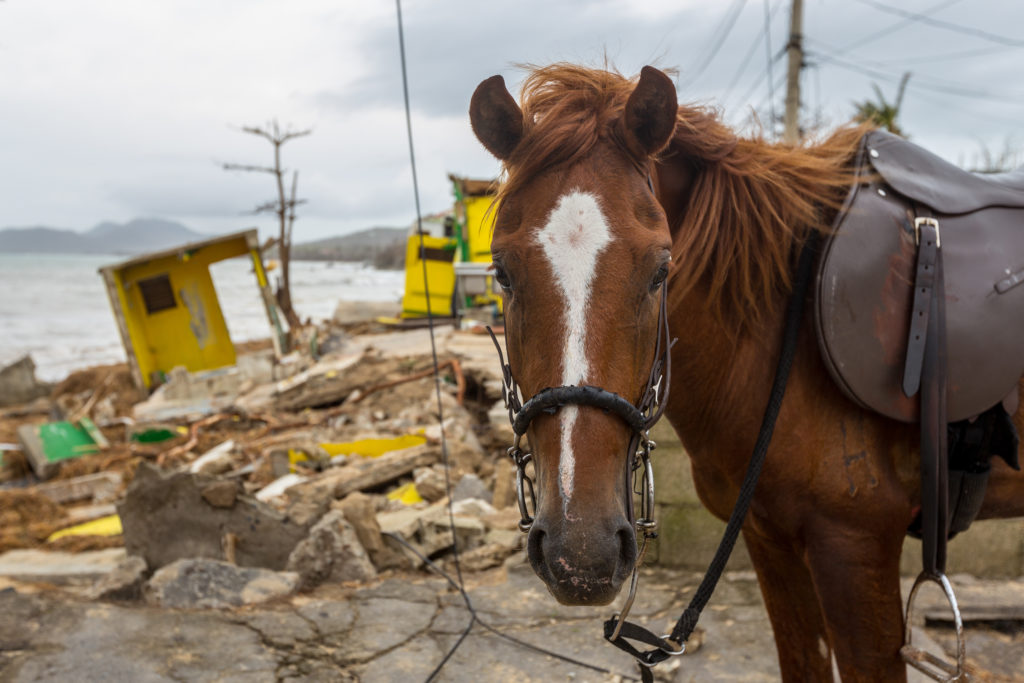 This new language is about speaking life to the life that’s already present, life in the rebuilding of our island, our economy, our electric grid through massive solar panels, through justice, tourism and a new way of reclaiming our land as our own, our source of food. A movement of radical food justice through farming and agro-ecology are the new tools of our own sustenance. No cooptating, no dependency. Puerto Rico speaks life and reclaims food sovereignty, no longer will we go hungry. “Mortal, can these bones live?” Yes, they can. Ezekiel’s vision of the valley of the dry bones emerges from devastation and for Puerto Rico, our new language is born out of a category five hurricane, exposing political, social and environmental vulnerability, just as Katrina exposed the ugliness of racism, oppression and poverty of New Orleans’ Ninth Ward.
This new language is about speaking life to the life that’s already present, life in the rebuilding of our island, our economy, our electric grid through massive solar panels, through justice, tourism and a new way of reclaiming our land as our own, our source of food. A movement of radical food justice through farming and agro-ecology are the new tools of our own sustenance. No cooptating, no dependency. Puerto Rico speaks life and reclaims food sovereignty, no longer will we go hungry. “Mortal, can these bones live?” Yes, they can. Ezekiel’s vision of the valley of the dry bones emerges from devastation and for Puerto Rico, our new language is born out of a category five hurricane, exposing political, social and environmental vulnerability, just as Katrina exposed the ugliness of racism, oppression and poverty of New Orleans’ Ninth Ward.
A sacred vision
My first Saturday on the island and the last day before the hard work was to begin, feeling lonely and with a heavy heart, my soul needed nourishment, so I took an early morning 45-minute drive to my favorite place to talk to God: the beach. This time, the mounds of debris and trees piled along each side of the highway were like walls of a fortress protecting me. I felt safe and with such peace. Suddenly before me in the exquisite tropical misty horizon of an early Sabbath morning, the most glorious and majestic mountains appeared.
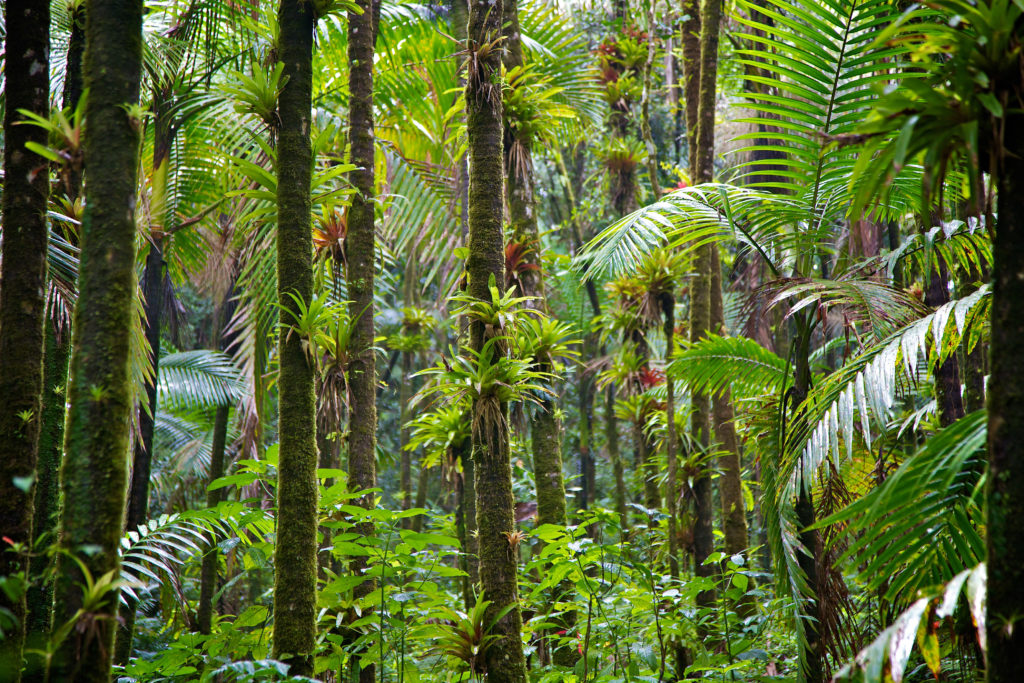 Mountains completely covered with the deepest and most vibrant shade of green, life. I did not notice this green on my arrival. Dense and lush vegetation, not a single bare spot on these mountains. Glorious and majestic puffy clouds of mist kissing the top of our El Yunque rain forest. A holy and sacred vision filled with God’s breath of life. I saw it, I felt it, I witnessed it, and I began to weep tears of joy and immense gratitude. Tears of hope, for I was gently reminded that the Spirit, the wind, the breath of God can still bring life even in the midst of desolation. The Spirit, the wind, the breath of God is giving life to my island. Ruach, Hebrew for breath of God, brings hope from hopelessness and life from death and a new meaning of life, is emerging from within my people.
Mountains completely covered with the deepest and most vibrant shade of green, life. I did not notice this green on my arrival. Dense and lush vegetation, not a single bare spot on these mountains. Glorious and majestic puffy clouds of mist kissing the top of our El Yunque rain forest. A holy and sacred vision filled with God’s breath of life. I saw it, I felt it, I witnessed it, and I began to weep tears of joy and immense gratitude. Tears of hope, for I was gently reminded that the Spirit, the wind, the breath of God can still bring life even in the midst of desolation. The Spirit, the wind, the breath of God is giving life to my island. Ruach, Hebrew for breath of God, brings hope from hopelessness and life from death and a new meaning of life, is emerging from within my people.
I arrived at the beach and more of God’s breath greeted me there: beautiful and serene and blue waters, families gathered, sharing, laughing, cooking, dancing, children playing and swimming. And the sounds of salsa, Reggaeton and the aroma of fried fish and conch fritters permeated the warm ocean breeze. I was surrounded by God’s breath of life, God’s spirit dancing. It was only ten in the morning and the beach was packed with human resilience, passion, determination, tenacity, pride, love, hope, spirit, life and Puerto Rican flags flying all throughout the beach. “Mortal, can these bones live?” Yes, Lord they can.
Can you feel the wind?
If all of this sounds a bit too romantic for you, let me invite you to fast forward about 400 years to that locked room in Jerusalem occupied by a saddened, fearful, discouraged, despondent and confused group of Jesus’ disciples and followers. Now Jesus had promised the gift of the Holy Spirit, whatever that means. But they cannot see any possibility of hope, they cannot get past the separation and the grief. They, too, are in a valley of dried bones of their own, when suddenly there is the rush of mighty winds and tongues of flame that ignite them and they are driven out of their safe, locked, tucked-away room and begin to proclaim the good news that dried bones can live, that life comes from death and in Christ there is always hope. But you know what’s even more beautiful, the Spirit, the breath of God still is upon us 2,000 years later.
So now I ask you, what about the Dry Bones that we encounter in our individual lives, in our churches, in our work, in our communities? What do we do? Do we just give in to the hopelessness? The scapegoating? The buck passing? Tweeting? Excuse making? The blame game? The greedy grasping for me and mine? The violent acting out which seems to be the new way of our society? Is this how we should deal with the serious issues that confront us as a community, as a nation, as a people? Do we allow the dry bones to define our lives? The Spirit of God is still at work in our world, bringing life to boneyard lives and communities.
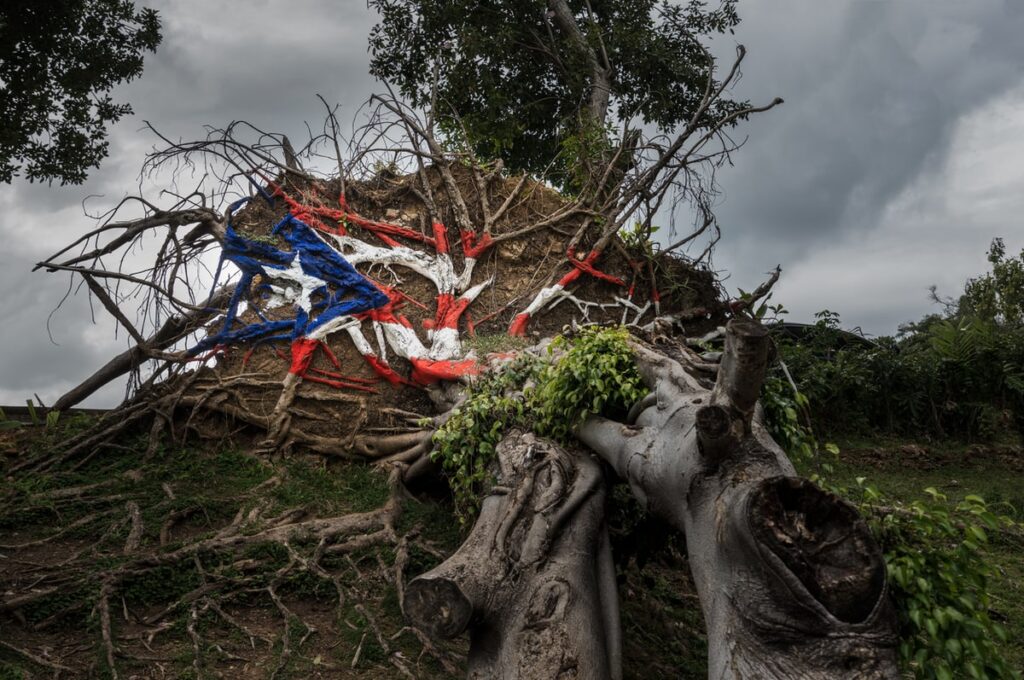 We have to believe that, we have to hold on to that. And that same mighty wind is the same spirit hovering over my beloved Puerto Rico, infusing my island, my people with hope and a new life. Can you feel it?
We have to believe that, we have to hold on to that. And that same mighty wind is the same spirit hovering over my beloved Puerto Rico, infusing my island, my people with hope and a new life. Can you feel it?
The spirit is always at work in your life, in my life, in my Borikén, in our community and in the church, calling us to breathe and speak life into those places and circumstances that may appear lifeless. “Mortals can these bones live?” Yes, they can. There is life in the valley of dried bones and you know why I know? Because the Spirit said so.

